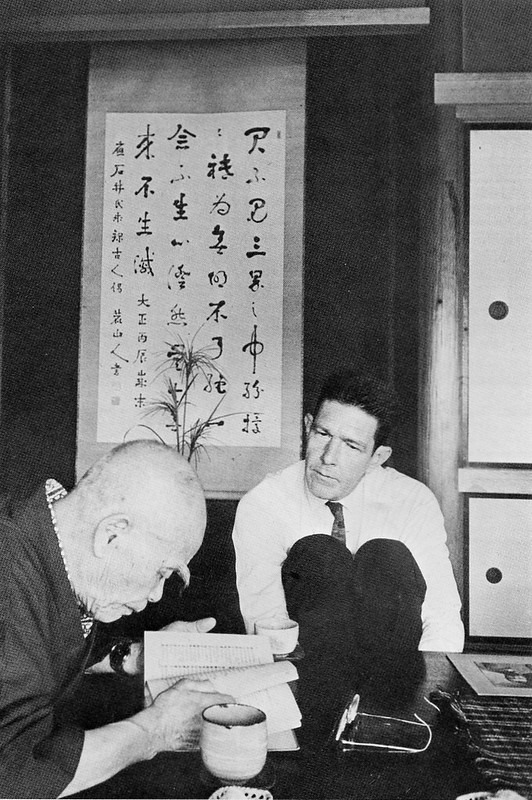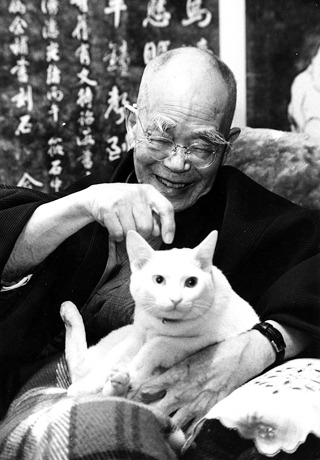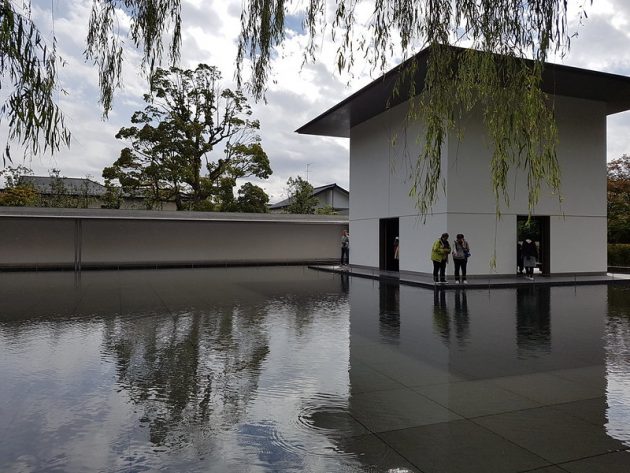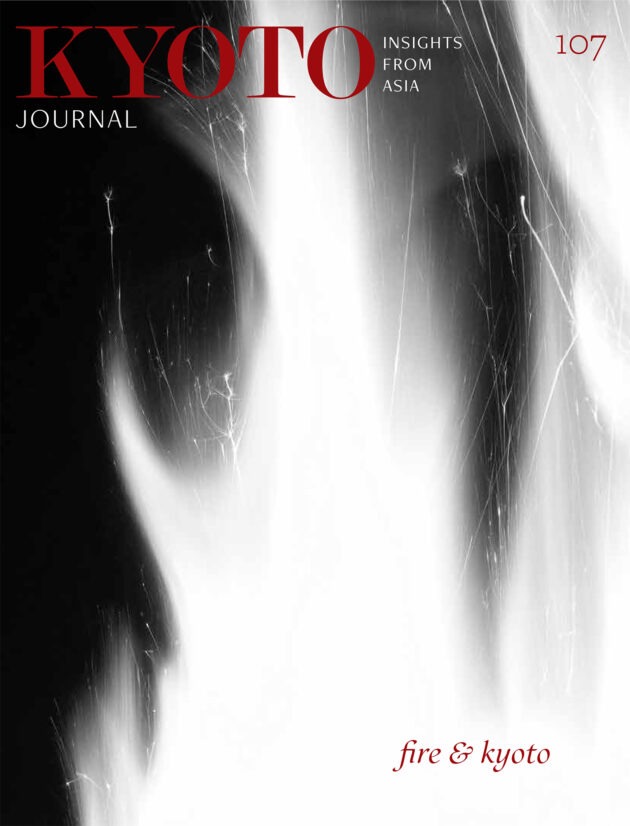The Japanese word zen has been swept into the worldwide mainstream and is now as well known as the words samurai, sushi, geisha or haiku. This likely wouldn’t have come to pass had it not been for a Japanese scholar named D.T. Suzuki (Suzuki Daisetsu Teitaro, 1870-1966). Through his lectures and books — most notably Introduction to Zen Buddhism, Zen and Japanese Culture and the series Essays in Zen Buddhism — Dr. Suzuki promoted the understanding of Mahayana Buddhism and the links between Zen and Japanese culture to a worldwide audience, influencing generations of individuals, especially Westerners, seeking intellectual and spiritual awakening.
As a young man in early Occupied Japan, Donald Richie — a masterly writer who himself would play a leading role in introducing Japanese culture and film to the West — visited Dr. Suzuki a number of times at the Matsugaoka Bunko, a Buddhist library that Suzuki founded in 1946 on the hillside grounds of the Tokeiji temple compound in Kamakura.
As 2006 marked the 40th anniversary of D.T. Suzuki’s death, the Matsugaoka Bunko Foundation, executor of his literary estate, published a special book of essays on Suzuki in commemoration. The following interview with Richie, in which he humbly recollects his encounters with Suzuki, was part of this publication. Yoshie Ishibashi Osawa a researcher and graduate student at the University of Chicago specializing in post-war cultural history, talked with Richie on November 18, 2005 at his apartment in Tokyo. While Richie has mentioned D.T. Suzuki in some of his books, this first in-depth commentary on their relationship gives us a piece of missing cultural history.
—Patricia Donegan
Interview with Mr. Donald Richie on November 18, 2005
Yoshie Osawa: When did you first hear about Dr. Suzuki? Was it through Ruth Sasaki in New York?
Donald Richie: Yes, I met Ruth Sasaki during the war. I was in the Maritime Service (Merchant Marine) and my ships would often call in New York. Among the people I met there was a poet, Lindley Williams Hubbell, and he became a friend of mine. He was interested in Japan and very interested in Zen. So one day he took me along with him to the first Zen Institute, which was then located in a townhouse in the East 50s and Ruth Sasaki was presiding. This was probably after the end of the War, in 1945, before I went to Japan. The seventh anniversary of Ruth’s husband’s death was being held in a temple in Ibaraki, and when she found that I was going to Japan, she asked if I could represent her.
So I found my way out to Ibaraki and I was her stand-in. And among the people there was Dr. Suzuki. None of the other clergymen spoke English but Mr. Suzuki did. He was very kind to me. When we parted that night, he suggested I come down to see him at Enkakuji. This was in February 1947, and I never had had any Japanese food before, did not even know how to use chopsticks, spoke not a word of the language. But I found Enkakuji and I brought him presents. We sat on his sofa and we talked about Zen for a while and he realized that I did have some interest in this but should also understood that I had no talent for it.
What do you mean by “no talent”?
At first, he didn’t know what to do with me, so he put me into the Zendo with all the other Japanese there doing zazen that day. I knew that I was to keep my mind clear and sit in such and such a position. I knew I wasn’t supposed to think. But of course, I thought, my legs hurt, and I wondered about breakfast…but Dr. Suzuki soon realized that though I was sort of intellectually interested in Zen, I was not capable of doing anything much about it.
I would often go down to see him because I loved to talk to him. And we talked almost entirely about Zen. Whatever I learned from him is in my little book Zen Inklings. And he was always very nice to young people and he never proselytized. Also at this time there was not very much food in Japan, so maybe he liked my presents: cheese, crackers, things like this.
Yes, absolutely I think that must have helped him.
He’d always take my presents into the kitchen and I’d never seen them again…that’s how I got to know him. Our relationship as such was very casual — teacher and student. I was not a very good student in that it never grew into anything. But nonetheless, he had some sort of feeling because at one point, he loaned me the Hakuin [an original painting by the Edo-period Zen priest and prolific painter Hakuin].
Yes, I was surprised to hear about it.
Whether he loaned me the Hakuin to shock me into some sort of kensho, I don’t know. At any rate, it didn’t have that effect on me. But I loved living with it and eventually I got used to it. It became invisible. Since it was not a gift, I kept it for half a year, and then I took it back to him again. For him, things like this had no intrinsic value. He treated that painting just like it might have been a newspaper.
When was the last time you saw Dr. Suzuki?
I don’t remember that. It must have been in passing, probably in Tokyo. One of the reasons you don’t remember is that you don’t want to remember. And you forget what you want to forget. And I always felt that in a way I might have disappointed Dr. Suzuki — I mean it’s very egotistical to say that — but at least I wanted to succeed in doing something which I obviously didn’t. I didn’t understand Zen, I didn’t get kensho, I didn’t get anything. And Dr. Suzuki understood this perfectly and he never pressured me. And he realized that I would be one of those people who would talk about Zen intellectually and never experience the emotional reality of it and he accepted that. If I felt guilty about this, then it’s one of the reasons perhaps why I forgot our last meeting.
I see. My knowledge of Dr. Suzuki is that he was a scholar and a Zen practitioner. But I heard he never identified himself as a Zen monk although I heard he did meditation.
I think that is true. He made it clear to me the first time I met him — he used the simile of mountain climbing and made a point of saying that he had not climbed Mt. Sumeru. But he had climbed many other mountains and so he knew about mountain climbing in general. But he didn’t know about climbing this particular mountain at the summit of which lies illumination. So he was perhaps intimating that he himself never experienced this, but he never said he didn’t.
So, when you first met him, you thought he was a scholar and a practitioner, but not a monk. Did you feel he was an enlightened human being?
I don’t know how an enlightened human being acts. But his whole approach to this was that he was a fellow worker, that he was a journeyman. That he was a craftsman, a practitioner. But I never felt that he set himself up as an expert or somebody who had discovered through experience the benefits of illumination. And ecclesiastically speaking, there was nothing pious about him, nothing holy. His integrity, was of course enormous, but there were no high-church mannerisms.
D. T. Suzuki is credited with introducing Zen to the West. Do you think this is an accurate assessment of him?
Dr. Suzuki’s books helped stimulate the “Zen boom” — his books reached the Beat generation; so we have Jack Kerouac and Allen Ginsberg, and people carrying on about their version of Zen — the ‘Beat Zen’ sort-of-thing — but he is not responsible for this. However, you can say that he was the conduit through which this “public Zen” appeared. I don’t think he would have approved of it at all. But this is indeed what happened through the fact that he had written so much, had written so plainly, and written so clearly.
What do you think is Dr. Suzuki’s legacy?
I think that Dr. Suzuki is for Zen what St. Paul is for Christianity. He was “a publicist.”
Well said. He is far more known overseas than in Japan.
It would follow because Dr. Suzuki only wrote in English. This is the language he chose to write in. His writing on Zen in English is far too certain to fit the Japanese language. There is nothing vague about Dr. Suzuki. And English helped him not to be vague. If he were to write in Japanese, the structure of the language is such that it would be very difficult to be absolutely certain. There is always some vagueness, which is usually considered to be more attractive — particularly in great testaments left by Zen people like Dogen. However, English does not allow you to do that — in fact, St. Paul in English comes out fairly forceful, but whether he does so in Aramaic, which is what he wrote in, in Hebrew or in Greek, which he knew, or Latin, I don’t know. But in English he comes out very, very certain about everything. So consequently Dr. Suzuki’s ideas were in a way formed by the language he was using.
One of the reasons for his popularity abroad is precisely the fact that he is the only person who made the vagaries of Buddhism seem real and explained them. So when you read Dr. Suzuki, it’s difficult. But no more than a Western philosopher. Hegel is difficult, Kant is difficult. Dr. Suzuki can be difficult, but behind it, is a mind which is seeking to make sense of whatever it is he is saying.
I remember you quoted him saying that “You [Richie] are very much of this world.”
He didn’t say, “I’m sorry, but…” He just stated as a matter of fact: “You are very much of this world”. I already knew enough about Zen to know that a successful Zen person is not a man of this world. They are men of spirit or men of something else. I was very fleshy, I was tied to my flesh. I was very much myself, and he was recognizing this. It was preparatory, to his suggesting that we don’t do Zazen any more. He always gave everybody his full attention. He was a real gentleman. I never saw him short with anybody, I never saw him rude with anybody.
D.T. Suzuki Museum
I was wondering who else could replace Dr. Suzuki.
Nobody. Zen is sort of “Zenned” out now. I mean, Dr. Suzuki knew perfectly well that what they say about Zen is that you cannot describe it, you cannot talk about it, it is incapable of [this kind of] transmission. All of this is classically said of Zen. Now, the person who knows that and yet writes books after book doesn’t believe that, certainly Blyth didn’t believe it. So therefore we have a whole library of Zen books now, “Zen as Psychiatry,” “Zen as Aesthetics,” “Zen as Religion,” “Zen as Self-help.” So I don’t think anybody is writing about Zen anymore. What more can you say? Not much. The idea of limiting Zen to what you can say is “anti-Zen.”
That’s true. As you said, the self is illusion — and that alternate ways of thinking are important.
Alternate ways of thinking are very important. I didn’t know that before. Nobody knows it, you have to learn it. It has to be demonstrated to you. This is what Dr. Suzuki demonstrated without attempting to do so. This is what I picked out of my experience and this changed me for the better. Very precious, yes. It would have probably taken me a lot of time to achieve that, if it had not been for Dr. Suzuki — very much a stimulant, very crucial. I suddenly realized that there is more than one way of thinking about anything — there is always an alternate way of thought. So I was able through him, to give up probably the worst thought pattern that Westerners have, which is to see everything as a dualism. I was for the first time able to see this and able to counter it by no longer attempting to place this grid of duality on everything. Most people still can’t do that.
It’s hard.
Yes, because you grow up with it. And the Japanese did not use to have it, but of course the Japanese have now absorbed that along with everything else. So, their patterns of thought have become highly Westernized and “dualism” is such a handy tool. That’s why it is popular, I think.
Dr. Suzuki’s essay on “Christianity and Buddhism” was published in the Pacific Stars and Stripes. Was it the only one published while you were there?
Yes, that was the only article while I was there. I don’t think there had ever been another one. I had enough trouble getting it printed. The people in charge were saying, “That’s feudal, we Americans don’t like feudal things.” It was not feudal, it was Buddhism, but it was the same thing for them. Nonetheless, we did have a few enlightened officers, so I was able to push it through.
There are some negative views of Dr. Suzuki, for example in some essays that he showed “cultural chauvinism,” and it has been said that he promoted caricatures/stereotypes of the East/West…
I am familiar with that kind of talk. That kind of talk was not possible until the 90’s. You could not talk like that in the 50’s. Those concepts were not available in the 50’s. These are retroactive constructions which were made in the 90’s. Because in the 90’s, the intellectual climate was such that the main movers were post-colonialism, pro rising of the minorities and the complete breakdown of any identity structures. So it was very easy to say “Japan and the West” back in the 50’s but it’s very difficult now to say “Japan and the West” because you say, “well, which West? Or which Japan” Because things are made of plurality and they were built of singularity before. So words become intellectually much more complicated than they used to be. Beyond that there are all sorts of special-interests groups who are pushing their own agendas. And the interest among scholars now is to be up to date with all the latest theories. So it means that if anything smacks of colonialism or chauvinism, it automatically becomes a bad thing. But this is only fairly recent.
I mean, as I said earlier, it depends on how you think about it. Which mindset are you going to put on today? Shall I wear a blue hat today or the red one? Perhaps I am going to wear my 1990s model, so I would say, Yes, Dr. Suzuki did postulate the existence of “an East” and “a West” and he did postulate the existence of Japan which was “unique.” He did all those things because those were the tools that were available to him.
I think that when you look at scholarship, you have to be very careful about your time values. Because those people back then, didn’t have any of these tools that are now available. Could I have talked about post-structuralism in the 1950s? No, so to hold Dr. Suzuki accountable for the fact that he didn’t have the latest power-driven tools, is very counter-productive. I think one could point out that he did not join the propaganda or the guns. That he did not take seriously the Japanese government’s very real chauvinistic attempts to push Japan to the helm of the “Co-Prosperity Sphere,” etc. That he did none of this should absolve him from the very kind of blame that they are now handing him.
Yes, indeed. Thank you very much for your time.
See also: Freedom within Bounds: A Conversation with Donald Richie

Author
Yoshie Ishibashi Osawa
Author's Bio
Yoshie Ishibashi is a historical researcher and translator. She was the researcher and cotranslator of Chiyo-ni: Woman Haiku Master, which won the Award for Translation from the Haiku Society of America in 1998, and a recipient of a Fulbright grant for graduate study.
Credits
Imagery sourced from Flickr and Omarpal.





